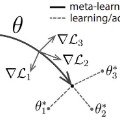Model-Agnostic Meta-Learning (MAML) has become increasingly popular for training models that can quickly adapt to new tasks via one or few stochastic gradient descent steps. However, the MAML objective is significantly more difficult to optimize compared to standard Empirical Risk Minimization (ERM), and little is understood about how much MAML improves over ERM in terms of the fast adaptability of their solutions in various scenarios. We analytically address this issue in a linear regression setting consisting of a mixture of easy and hard tasks, where hardness is related to the condition number of the task's loss function. Specifically, we prove that in order for MAML to achieve substantial gain over ERM, (i) there must be some discrepancy in hardness among the tasks, and (ii) the optimal solutions of the hard tasks must be closely packed with the center far from the center of the easy tasks optimal solutions. We also give numerical and analytical results suggesting that these insights also apply to two-layer neural networks. Finally, we provide few-shot image classification experiments that support our insights for when MAML should be used and emphasize the importance of training MAML on hard tasks in practice.
翻译:模型-不可测元学习(MAML)对于能够通过一种或几种随机梯度梯度下降步骤迅速适应新任务的培训模式越来越受欢迎。然而,与标准的经验风险最小化相比,MAML目标更难优化,对于MAML在各种情景中解决方案的快速适应性方面相对于机构风险管理的改进程度了解甚少。我们用由简单和艰苦任务混合组成的线性回归环境来分析这一问题,其中难度与任务损失功能的条件数有关。具体地说,我们证明,为了让MAML在机构风险管理方面取得重大收益,(一) 任务之间必须存在一定的难度差异,以及(二) 硬任务的最佳解决方案必须与远离简单任务最佳解决方案中心的中心紧密结合。我们还给出了数字和分析结果,表明这些洞见也适用于两层神经网络。最后,我们提供了几张图像分类实验,支持我们在使用MAML时的洞察点,并强调在实践中培训MAML的硬任务的重要性。




